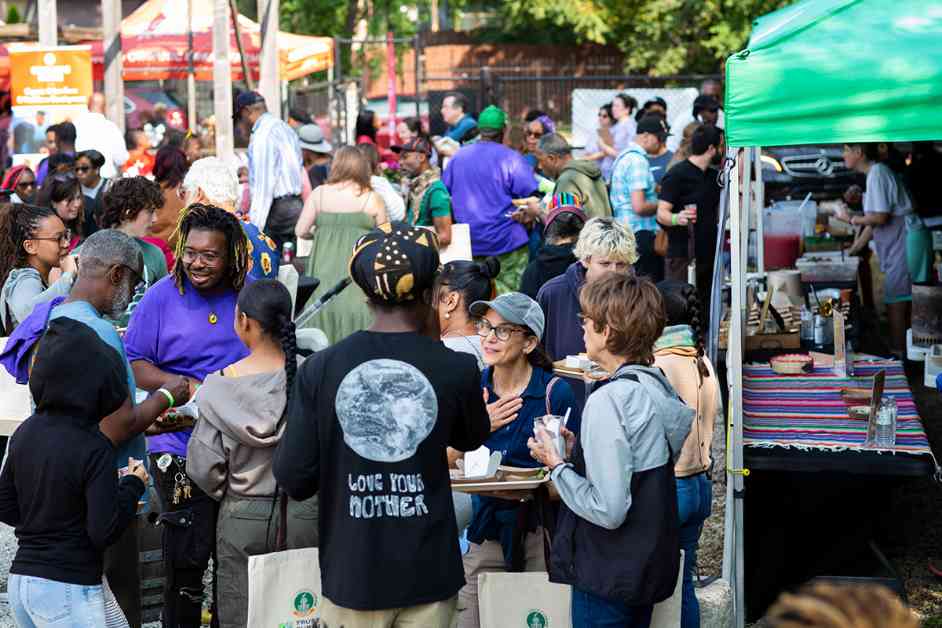The urban agriculture ecosystem in Chicago has experienced significant growth over the past two decades, expanding fivefold, according to Anton Seals Jr., the lead steward of Grow Greater Englewood. In Englewood, the closure of several grocery stores, including Whole Foods in 2022, highlighted the issue of food insecurity in the area. However, a renewed focus on access to city land and the importance of local food systems has led to the development of a solidarity economy on the south side. This new system connects local farmers, consumers, and food-based businesses, creating a collaborative environment where stakeholders work together to promote food solidarity. Despite these positive developments, Seals emphasizes that there is still more work to be done to ensure food access and security for all residents.
To celebrate and further expand the urban agriculture movement in Chicago, Grow Greater Englewood joined forces with Growing Home and the Urban Growers Collective to host the third annual Chicago Urban Ag Crawl on Sunday, September 8. This year’s event took place in Greater Englewood and attracted around 200 attendees. The crawl featured visits to 17 farms and gardens across Englewood, Auburn Gresham, and Back of the Yards, as well as offerings from 15 south-side chefs and caterers. This marked the first time the event had extended beyond Englewood, with Seals expressing the goal of eventually expanding the crawl citywide to support Black and Brown farmers throughout Chicago.
One of the key aspects of the Chicago Urban Ag Crawl was the opportunity for attendees to engage with local farmers and learn about the process of growing and producing food. Javon Cooper, accompanied by his mother Sheryl Elder and Growing Home workforce development specialist Janice Ellis, participated in the event and shared his enthusiasm for learning about sustainability and food production. Cooper, a current cohort member at Growing Home, highlighted the importance of acquiring skills that can benefit both himself and his family in the future.
Throughout the crawl, participants had the chance to visit various urban farms and gardens, such as Sistas in the Village, where co-owners Bweza Itaagi and Mecca Bey showcased their farming practices. The duo, who met during an apprenticeship at the Urban Growers Collective, emphasized the critical role that nutrient-dense foods play in promoting community health and well-being. Bey, a holistic nutrition practitioner, underscored the significance of food choices in either healing or harming individuals, highlighting the importance of growing and consuming fresh, locally sourced produce.
The Chicago Urban Ag Crawl also featured stops at Imagine Englewood If’s Peace Garden and Hammond’s Promise Land, where community members shared their experiences of cultivating the land and providing fresh produce to nearby residents. These initiatives not only contribute to food access and security but also serve as community gathering spaces for various activities and events. Alvin Hammond, the owner of Promise Land, reflected on the joy and fulfillment he derives from transforming a vacant lot into a vibrant and productive space that benefits the local neighborhood.
Anton Seals Jr. and Janelle St. John, executive director of Growing Home, addressed attendees during the ag crawl, emphasizing the importance of urban agriculture in healing the land and fostering community connections. As Seals noted, Black communities often face challenges in accessing nutrient-dense foods and education on healthy eating habits. Initiatives like Sistas in the Village and the Englewood Village Farmers’ Market play a crucial role in bridging this gap and providing affordable, fresh produce to residents.
The work of urban farmers like Mecca Bey and Bweza Itaagi is deeply rooted in their cultural heritage and connection to the land. Itaagi’s passion for farming reflects her Ugandan heritage, highlighting the intergenerational knowledge and practices that inform her approach to growing food. By incorporating indigenous traditions and techniques, growers on Chicago’s south side are not only preserving ancestral wisdom but also advancing sustainable farming practices that benefit present and future generations.
In conclusion, the Chicago Urban Ag Crawl serves as a testament to the resilience and creativity of the city’s urban agriculture movement. By bringing together farmers, chefs, and community members, the event showcases the power of collaboration in promoting food solidarity and access. As the urban agriculture ecosystem continues to expand, it is essential to support and uplift Black and Brown farmers who are at the forefront of this transformative work. Through initiatives like the ag crawl, Chicago is paving the way for a more sustainable and equitable food system that nourishes both the body and the community.

